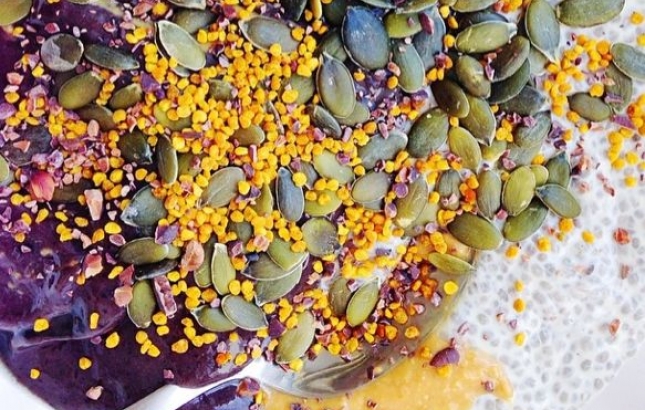
Benefits of Eating Bee Pollen
Natural bee pollen has long had health enthusiasts buzzing with excitement (and vitality)! Bee pollen is a coarse powder-like material that is produced by the anthers of flowering plants and gathered by bees. Bees package their pollen with nectar and enzymes that help it develop into a powerful super food available to humans, acclaimed for its ability to promote true vitality.
Natural bee pollen has long had health enthusiasts buzzing with excitement (and vitality)! Bee pollen is a coarse powder-like material that is produced by the anthers of flowering plants and gathered by bees. Bees package their pollen with nectar and enzymes that help it develop into a powerful super food available to humans, acclaimed for its ability to promote true vitality.
Recent posts by Renée Leonard-Stainton
Bee pollen is particularly concentrated in all elements necessary for life. It’s composed of 10 to 15 percent protein and also contains B- complex vitamins, vitamin C, essential fatty acids, enzymes, carotene, calcium, copper, iron, magnesium, potassium and manganese. It contains more amino acids than beef, eggs, or cheese of equal weight. According to researchers at the Institute of Apiculture, Taranov, Russia, "Honeybee pollen is the richest source of vitamins found in Nature in a single food”.
Like other bee products such as Manuka honey or propolis, bee pollen has an antimicrobial effect. A report from the Agronomic Institute, Faculty of Zootechnics, Romania, demonstrate the immune-strengthening effects of bee pollen “An increase has been recorded in the level of blood lymphocytes, gamma globulins, and proteins in those subjects given pollen in comparison with control groups.” Lymphocytes are white blood cells that can be seen as the ‘soldiers’ of the immune system. They are responsible for ridding the body of injurious and harmful substances, including infected or diseased cells, mutant and cancerous cells, viruses and metabolic waste. Gamma globulin is a protein formed in the blood, and our ability to resist infection is closely related to this protein's activity.
People worldwide have successfully used bee pollen to treat a variety of ailments, including:
- Digestive issues such as indigestion, diarrhea and constipation - Anemia
- Low energy and fatigue
- Depression
- Skin conditions such as acne
- Sexual problems
- Rheumatism and arthritis
- Low immunity
- Recovery from chronic illness
- Weight control
One of bee pollen's many intriguing benefits is its ability to improve allergies. It seems counterproductive to fight pollen allergies (such as hay fever) with pollen, but for many, bee pollen seems to have an immunizing effect against these reactions. If you use bee pollen to treat allergies, proceed with care and speak to a health professional first. A very small minority of people (an estimated 0.05 of the population) may be allergic to bee pollen. It is best to try taking a small amount at first and watch for a developing rash, wheezing, discomfort or any other signs of a reaction. If such symptoms occur, discontinue taking bee pollen.
Bee pollen can be taken in capsules or tablets, but bee pollen in granule form is ideal for optimum nutrition. Look for color variations in bee pollen granules as a variety of colors represents a variety of pollen sources, providing a broader range of nutrients.
The amazing bee has provided us with yet another beneficial natural food supplement!
Live well, live long, live naturally x



